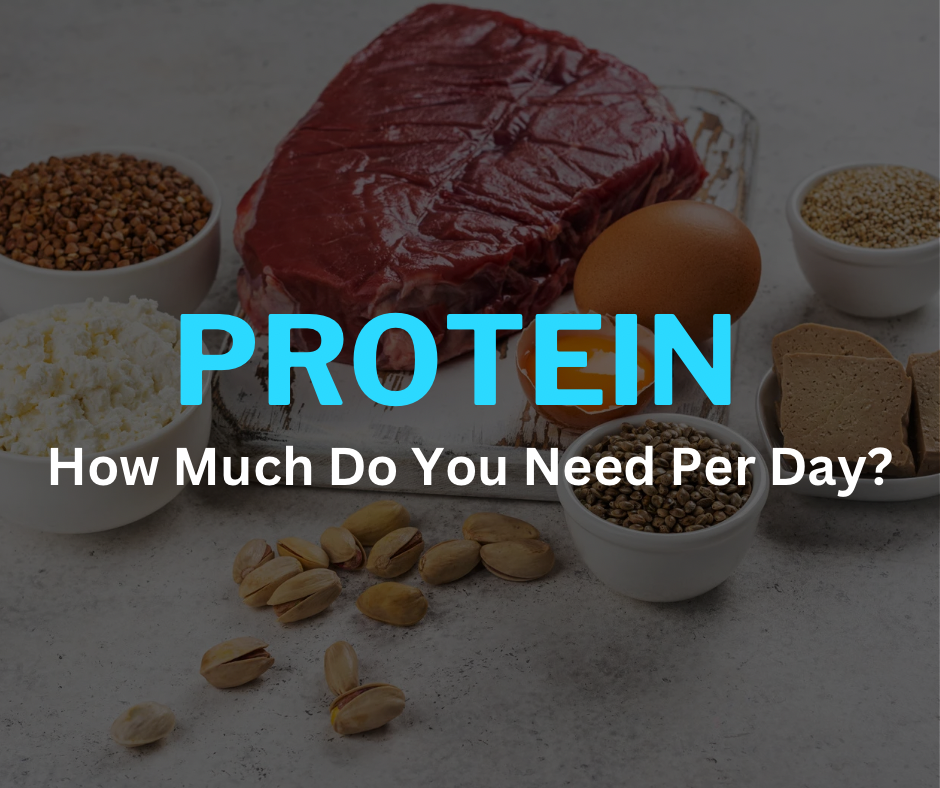How Much Protein Do You Need Per Day?
Understanding Protein Consumption
Protein, a crucial macronutrient composed of amino acids, which serves many roles in maintaining optimal health. Despite it being well known for its significance, determining the appropriate daily intake of protein remains unknown for many.
This article aims to educate the importance of protein, its recommended intake, and practical strategies to meet individual dietary needs effectively.
What is Protein, and Why Do We Need It?
Protein serves as the building blocks for various bodily structures and functions, including hormone synthesis, enzyme production, and tissue repair. It supports muscle growth, maintenance, and recovery, making it indispensable for overall well-being. While the body can synthesise certain amino acids, essential amino acids must be obtained from dietary sources, highlighting the importance of a balanced protein intake.
Determining Daily Protein Requirements:
The optimal amount of protein intake varies based on several factors, including activity level, muscle mass, gender, weight, and fitness objectives. According to the Dietary Reference Intake Report (DRI), sedentary adults are advised to consume 0.8 grams of protein per kilogram of body weight daily, accounting for approximately 10-35% of total calorie intake. However, individual protein needs may exceed this recommendation, particularly for those with higher activity levels or specific fitness goals.
Tailoring Protein Intake:
For individuals seeking to maximise the benefits of protein consumption, surpassing the minimal requirements is advisable. Recent scientific research suggests aiming for approximately 30% of daily calories from protein-rich sources, promoting satiety, metabolic efficiency, and muscle preservation. Gender-specific considerations also apply, with males generally requiring higher protein intake due to greater muscle mass and energy expenditure.
Protein Intake for Muscle Growth and Weight Management:
Protein requirements are intricately linked to muscle mass and metabolic demands. Those aiming to build or maintain muscle mass should consume between 1.8 and 2.5 grams of protein per kilogram of body weight daily, accompanied by appropriate strength training. Conversely, individuals focusing on weight loss should prioritise protein intake to preserve lean body mass, support metabolism, and promote satiety, aiming for 30% of daily calories from protein sources.
Incorporating protein-rich foods into your dietary intake is essential for meeting recommended intake levels. Foods such as lean meats, poultry, eggs, dairy, legumes, and seafood offer diverse amino acid profiles and contribute to overall nutritional balance. Additionally, protein supplements, such as quality whey protein isolate, provide a convenient option to increase daily protein intake, particularly for individuals with heightened dietary requirements or busy lifestyles.
Key Takeaways:
– Protein is a fundamental nutrient essential for various bodily functions and structural integrity.
– Individual protein requirements depend on factors such as activity level, gender, and fitness goals.
– Aim to obtain approximately 30% of daily calories from protein-rich sources for optimal health and performance.
– Tailor protein intake based on specific objectives, such as muscle growth or weight management.
– Including a source of protein in every meal facilitates meeting daily protein targets and promotes overall dietary balance.
Conclusion:
Understanding the role of protein in the diet and tailoring your protein intake to suit your needs is important for optimising health and performance. By prioritising protein-rich foods and adhering to personalised guidelines, individuals can achieve their fitness goals, support muscle integrity, and enhance overall well-being. Protein is key importance with any nutritional plan, so its a good idea to lay the foundation with your protein consumption
